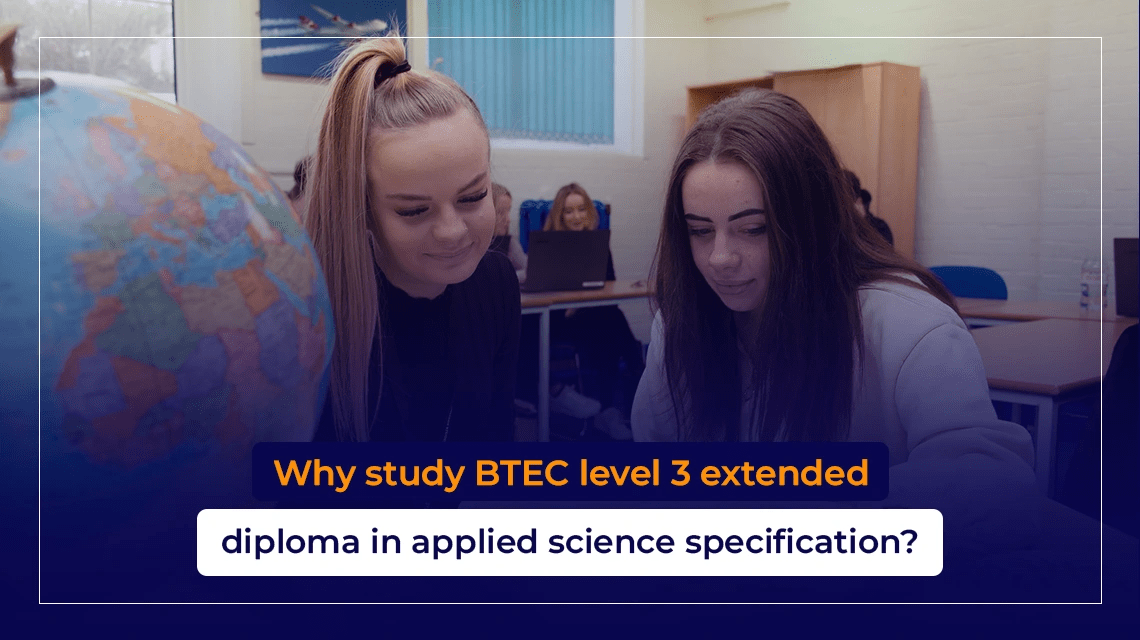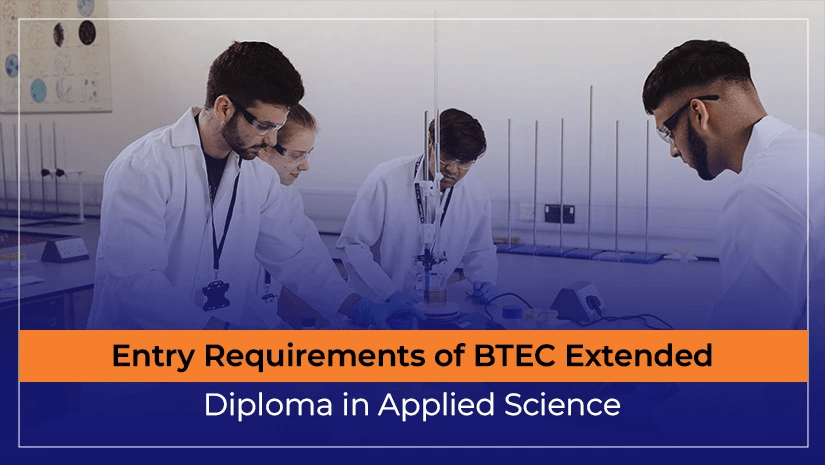
The BTEC Level 3 Extended Diploma in Applied Science (Pearson 2025 specification) is an advanced vocational qualification equivalent to three A-Levels under the Regulated Qualifications Framework (RQF). It provides a rigorous foundation for learners aspiring to enter higher education in applied, biomedical, or environmental sciences, or to begin professional roles within laboratory, healthcare, and engineering settings.
This diploma emphasises a blend of scientific theory, laboratory practice, and problem-solving skills aligned with contemporary STEM standards. According to the latest specification, students gain practical and analytical expertise essential for university progression and technical careers.
The program is a two-year comprehensive course structured to cover the major scientific disciplines, Biology, Chemistry, Physics, and Mathematics, along with emerging topics such as genetics, sustainability, and thermodynamics.
Under the 2025 Pearson specification, units include:
Each unit integrates theory with real-world application through laboratory investigations, research reports, and externally moderated assessments. The inclusion of externally marked components ensures parity with A-Levels, meaning Russell Group universities now consider the qualification a robust entry route for science-related degrees.

To enrol, learners typically need:
While there are no absolute barriers, these entry criteria ensure readiness for the analytical and quantitative demands of the Level 3 program. According to the Pearson BTEC National framework, successful completion can yield up to 168 UCAS Tariff Points, equivalent to three A* grades at A-Level.
Teaching follows a blended and experiential model combining:
These approaches nurture scientific reasoning, data interpretation, and teamwork, helping students adapt to the inquiry-based style of higher education. Group and collaborative tasks mirror professional lab environments, emphasising communication and safety standards.
Assessment is modular and varied, employing:
Each unit combines internal and external evaluation to ensure consistency with Ofqual-approved academic standards. This balance of coursework and examination helps develop both applied and theoretical competence.
The BTEC Level 3 Extended Diploma in Applied Science opens diverse pathways. Students gain the foundation to progress into:
Higher Education Degrees:
Employment and Apprenticeships:
An industry placement is often encouraged, enabling learners to experience real scientific workplaces. Many organisations recruit directly from these placements, enhancing employability and professional readiness.
According to education experts, the BTEC model encourages applied learning, making students adaptable to both academia and professional research settings.
Students learn through laboratory-based investigations supervised by qualified instructors with professional research experience. Educators specialise in chemistry, biology, physics, and data analytics, ensuring content relevance to current scientific practices.
Coursework mirrors authentic workplace scenarios, allowing learners to connect theoretical understanding with operational science. Topics such as industrial applications, physiology, and quantitative analysis are taught using current scientific tools and methodologies.

You can pursue degrees or employment in applied science, biomedical research, or environmental technology. Roles include laboratory technician, analytical chemist, radiographer, or biomedical scientist.
Yes. Most universities, including Russell Group institutions, accept it for science-related courses like chemistry, biochemistry, medical technology, and physiotherapy.
Starting salaries average £25,000–£30,000 per year for lab technicians and graduate scientists, potentially rising to £60,000+ for senior researchers and engineers.
It balances academic rigour and vocational skill development, aligning with UK STEM priorities and higher education entry requirements for 2025 onward.
The BTEC Level 3 Extended Diploma is equivalent to three A-Levels in terms of UCAS tariff points and academic rigour. However, while A-Levels are more exam-focused, the BTEC emphasises practical application, laboratory projects, and continuous assessment. This makes it especially suitable for students who learn best through applied, hands-on methods rather than purely theoretical exams.
Yes. The qualification, awarded by Pearson (the UK’s largest awarding organisation), is recognised by universities and employers worldwide. Many international institutions, especially in Europe, the Middle East, and the Asia-Pacific, accept the Extended Diploma for admission into science-related undergraduate programs.
Students gain a mix of technical, analytical, and transferable skills, including:
After completing the program, learners may:
Begin technical employment in analytical labs, research facilities, or pharmaceutical companies.
According to the Pearson 2025 framework, the qualification provides a flexible bridge between education and professional science sectors.
Studying the BTEC Level 3 Extended Diploma in Applied Science specification offers a complete route into scientific education and practice. Combining theoretical knowledge with extensive practical application, it prepares learners for both university progression and technical employment in the expanding global science sector.

December 22 2024

February 25 2024

February 25 2024

February 25 2024

 Dr. Shafiq
Dr. Shafiq
 February 25 2024
February 25 2024
 05:40:00
05:40:00
Do you have a career plan in a Senior Care or Supervisory Care position? If so, a Level 3 Diploma will help...
Read more...
 Dr. Shafiq
Dr. Shafiq
 February 25 2024
February 25 2024
 05:43:00
05:43:00
If you are living in the UK or planning to do that, you must know about the education system there. The UK&...
Read more...
 Dr. Shafiq
Dr. Shafiq
 February 25 2024
February 25 2024
 05:50:00
05:50:00
In the recent past, you had to have a four-year bachelor’s degree to start a career. With the rapid c...
Read more...